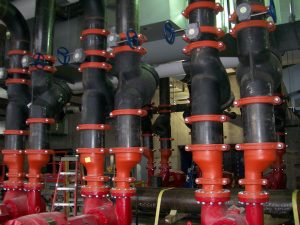
Smooth and energy-efficient operation is an important requirement that any kind of HVAC equipment installed in any type of environment must meet. HVAC appliances, even the small pieces of equipment used in residential buildings, are complex machines that need to be installed, maintained and repaired by professionals – here are the most important services provided by HVAC companies that you might need.
Cleaning and Maintenance
Whether you have a large, complex HVAC equipment that provides heating as well as cooling or you have a separate furnace and an air conditioner, your HVAC appliances need to be regularly maintained to ensure ongoing good performance. The maintenance services offered by professionals providing HVAC near me include the regular inspection and cleaning of the system, not only when it comes to the visible, easy to access components, but also the pipe system and the ductwork. Maintenance sessions usually involve measurements to ensure that the system is working properly and its operation is safe as well.
The Installation of New Systems
This process involves accurate calculations to determine the capacity of the system to be installed, the selection of the right product and the work phases related to the installation, followed by the testing of the system to ensure correct operation and safety.
Scheduled and Emergency Repairs
Repairs make up over 80% of the work of HVAC contractors. Most technicians are trained in repairing all three types of systems involved in HVAC, namely heating, ventilation and air conditioners, but many contractors chose to specialize in particular brands and types of equipment. This also means that when you are faced with a fault of your HVAC system and you need repair, the best solution is to look for a technician in your area who is a professional approved by the manufacturer of your equipment or that has specialized in working with your type of appliance. The repair process usually involves several visits by the technician – one visit to diagnose the problem and at least one other to perform the repair.
Many HVAC companies also provide round the clock emergency services – it is a good idea to look for such a company even for your scheduled repairs, just to make sure that you have a specialist on speed dial if you need to face an emergency.
Installing Accessories
One of the best ways to ensure the energy-efficiency of your HVAC system is to install a thermostat or, if your system already has an old-type thermostat, to replace the unit with a programmable device that also allows to divide the home in zones with different temperature settings. To implement such a modern thermostat, you will have to turn to a HVAC company that has experience with the process.
Energy Audits
With the increased demand for energy-efficiency, more and more homeowners hire HVAC companies to check their homes for any problem points through which thermal exchange takes place between the home interior and the exterior and to determine whether their HVAC equipment is working properly. The findings of such energy audits can help homeowners optimize their energy usage, reduce their energy costs and improve their building’s environmental performance.


 to go with any recommendation that your
to go with any recommendation that your